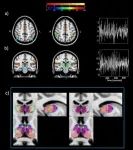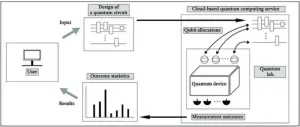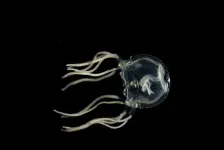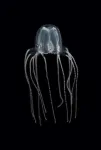A network that spreads light and the role of thalamus in our brain
A study conducted by researchers at the University of Liège (BE) Institute, using ultra-high field 7 Tesla MRI, are providing a better understanding of how light stimulates our brains
2023-09-22
(Press-News.org) New research conducted at the University of Liège, using ultra-high field 7 Tesla MRI, provides a better understanding of how light stimulates our brain and could provide new insights into how it works.
A research team at the ULiège GIGA Institute tried to understand better how light stimulates our cognition. Light acts like a cup of coffee and helps keep us awake. That's why we recommend not using too much light on our smartphones and tablets in the evening. This can disrupt our sleep. On the other hand, the same light can help us during the day. Many studies have shown that good lighting can help students in schools, hospital staff and patients, and company employees. It's the blue part of the light that's most effective for this, as we have blue light detectors in our eyes that tell our brains about the quality and quantity of light around us.
Once again, the brain regions responsible for this stimulating impact of light (also known as the 'non-visual' impact of light) are not well understood. "They are small and located in the subcortical part of the brain," explains Ilenia Paparella, doctoral student in the GIGA CRC IVI laboratory and first author of the article published in Communications Biology. The team of researchers from the GIGA-CRC-IVI was once again able to take advantage of the higher resolution of 7 Tesla MRI to show that the thalamus, a subcortical region located just below the corpus callosum (that connects our two hemispheres), plays a role in relaying non-visual light information to the parietal cortex in an area known to control attention levels. "We knew of its important role in vision, but its role in non-visual aspects was not yet certain. With this study, we have demonstrated that the thalamus stimulates the parietal regions and not the other way around, as we might have thought."
These new advances in our knowledge of the role of the thalamus will ultimately enable us to propose lighting solutions that will help cognition when we need to be fully awake and focused, or that will contribute to better sleep through relaxing light.
END
[Attachments] See images for this press release:


ELSE PRESS RELEASES FROM THIS DATE:
2023-09-22
Glass, despite its apparent transparency and rigidity, is a complex and intriguing material. When a liquid is cooled to form a glass, its dynamics slows down significantly, resulting in its unique properties.
This process, known as “glass transition”, has puzzled scientists for decades. But one of its intriguing aspects is the emergence of "dynamical heterogeneities," where the dynamics become increasingly correlated and intermittent as the liquid cools down and approaches the glass transition temperature.
In a new study, researchers propose a new theoretical framework to explain these dynamical heterogeneities in glass-forming ...
2023-09-22
A quantum machine can drastically speed up certain kinds of computation, but only if two or more quantum bits in the machine are entangled---that is, capable of displaying related behavior despite being separated. Seeking a way for users of cloud-based quantum computing services to detect qubit entanglement, Jiheon Seong and Joonwoo Bae of the Korea Advanced Institute of science and Technology developed and tested an entanglement witness circuit. It works to certify entanglement even when the cloud-based service allows only limited control ...
2023-09-22
A new research paper published in Science Advances reveals how changes in the size of the Yangtze River watershed may have led to the carving of deep canyons.
In this study, UNC-Chapel Hill professor Eric Kirby and his co-authors explore the impact of drainage basin expansion on the growth of the Yangtze River.
“This study presents a new model for when and how the Yangtze River was born,” said Kirby, “The Yangtze is one of the world’s great rivers, rising on the Tibetan Plateau at altitudes over 17,000 feet and descending ...
2023-09-22
When you see a familiar face upright, you’ll recognize it right away. But if you saw that same face upside down, it’s much harder to place. Now researchers who’ve studied Claudio, a 42-year-old man whose head is rotated back almost 180 degrees such that it sits between his shoulder blades, suggest that the reason people are so good at processing upright faces has arisen through a combination of evolution and experience. The findings appear September 22 in the journal iScience.
“Nearly everyone has far more experience with upright faces and ancestors whose reproduction ...
2023-09-22
Even without a central brain, jellyfish can learn from past experiences like humans, mice, and flies, scientists report for the first time on September 22 in the journal Current Biology. They trained Caribbean box jellyfish (Tripedalia cystophora) to learn to spot and dodge obstacles. The study challenges previous notions that advanced learning requires a centralized brain and sheds light on the evolutionary roots of learning and memory.
No bigger than a fingernail, these seemingly simple jellies have a complex visual system with 24 eyes embedded in their bell-like body. Living ...
2023-09-22
Jellyfish are more advanced than once thought. A new study from the University of Copenhagen has demonstrated that Caribbean box jellyfish can learn at a much more complex level than ever imagined – despite only having one thousand nerve cells and no centralized brain. The finding changes our fundamental understanding of the brain and could enlighten us about our own mysterious brains.
After more than 500 million years on Earth, the immense evolutionary success of jellyfish is undeniable. Still, we've always thought of them as simple creatures with very limited learning abilities.
The prevailing opinion is that ...
2023-09-22
About The Study: In this study using a behavioral experiment designed to mimic a real-world imposter scam among 644 older adults, a sizable number of older adults engaged without skepticism. The results suggest that many older adults, including those without cognitive impairment, are vulnerable to fraud and scams.
Authors: Lei Yu, Ph.D., of Rush University Medical Center in Chicago, is the corresponding author.
To access the embargoed study: Visit our For The Media website at this link https://media.jamanetwork.com/
(doi:10.1001/jamanetworkopen.2023.35319)
Editor’s ...
2023-09-22
About The Study: The results of this study of 220,000 American Indian and Alaska Native patients with Medicare insurance suggest a significant burden of cardiovascular disease and cardiometabolic risk factors. These findings highlight the critical need for future efforts to prioritize the cardiovascular health of this population.
Authors: Lauren A. Eberly, M.D., M.P.H., of the Indian Health Service in Gallup, New Mexico, is the corresponding author.
To access the embargoed study: Visit ...
2023-09-22
https://www.scienceopen.com/hosted-document?doi=10.15212/ZOONOSES-2023-0031
Announcing a new article publication for Zoonoses journal. Monkey B virus (BV) infection in humans and other macaque species has a mortality rate of approximately 80%. Because BV infects humans through bites, scratches, and other injuries inflicted by macaques, the simple and rapid diagnosis of BV in field laboratories is of great importance to protect veterinarians, laboratory researchers, and support personnels from the threat of infection.
Two recombinase polymerase amplification (RPA) assays with a closed vertical flow (VF) visualization strip (RPA-VF-UL27 and RPA-VF-US6) were developed that target ...
2023-09-22
A research group at the University of Helsinki and its partners have found a promising drug candidate for the treatment of amyotrophic lateral sclerosis (ALS). Cerebral dopamine neurotrophic factor CDNF prolongs the lifespan of and alleviates disease symptoms in rats and mice in animal studies.
Amyotrophic lateral sclerosis (ALS) is a rapidly progressing fatal neurodegenerative disease that affects the nerve cells in the brain and spinal cord. Specifically, a selective degeneration of motoneurons occurs in the spinal cord, leading to muscle atrophy and paralysis. Most patients with ...
LAST 30 PRESS RELEASES:
[Press-News.org] A network that spreads light and the role of thalamus in our brain
A study conducted by researchers at the University of Liège (BE) Institute, using ultra-high field 7 Tesla MRI, are providing a better understanding of how light stimulates our brains







